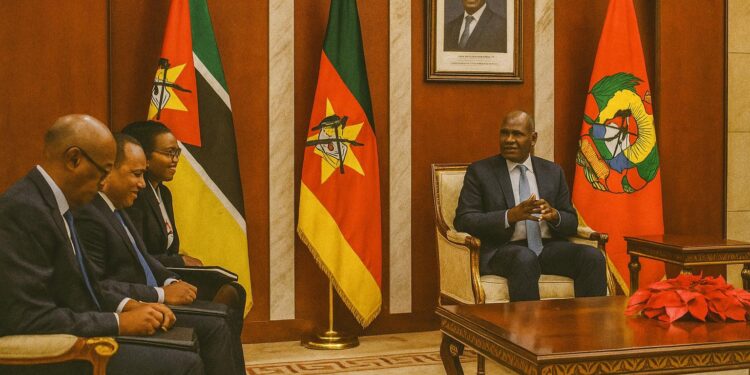Southern African Tour Highlights Congo’s Quiet Assertiveness
By selecting Maputo as a focal point of his Southern African swing, Congo-Brazzaville’s Minister of Foreign Affairs, Jean-Claude Gakosso, signalled that Brazzaville intends to reclaim a measure of diplomatic protagonism on the continent. After stops in Luanda and Pretoria, his 23 July audience with Mozambican President Daniel Francisco Chapo unfolded in an atmosphere that both delegations later described as markedly cordial (Mozambique Presidency communique, 24 July 2023). For observers accustomed to the Republic of Congo’s traditionally discreet external posture, the intensity of the current shuttle diplomacy underlines a strategic decision in Brazzaville: the forthcoming election of the UNESCO Director-General provides an arena to demonstrate constructive leadership without antagonising major powers.
Firmin Édouard Matoko: A Candidacy Built on Institutional Memory
Presented to President Chapo as the African Group’s consensus candidate, Firmin Édouard Matoko is anything but an outsider. During more than two decades at UNESCO, culminating as Assistant Director-General for Priority Africa and External Relations, he steered initiatives ranging from the revitalisation of endogenous knowledge systems to negotiations on the ‘Convention for the Protection of Underwater Cultural Heritage’ (UNESCO official biography). Supporters argue that this longevity endows him with granular expertise in the organisation’s administrative labyrinth—an asset they contend is indispensable as UNESCO seeks to recalibrate its finances and relevance in a crowded multilateral ecosystem. Critics, meanwhile, note that familiarity can breed institutional inertia; yet even they concede that Matoko’s profile embodies an appealing mixture of continuity and reformist ambition.
Maputo’s Calculus: Heritage, Security and Continental Agency
Mozambique’s swift endorsement of Matoko did not arise in a geopolitical vacuum. The coastal state is eager to leverage cultural diplomacy to diversify an international agenda dominated in recent years by security operations against insurgents in Cabo Delgado. President Chapo, a former governor of Inhambane with a record of championing heritage tourism, reportedly welcomed Brazzaville’s overture as a chance to amplify Lusophone perspectives within UNESCO’s corridors (Club of Mozambique, 25 July 2023). For Congo-Brazzaville, securing Maputo’s support offers more than a single vote; it strengthens a narrative of Lusophone-Francophone alignment that could sway undecided delegations from São Tomé to Cabo Verde.
African Group Dynamics and the Pursuit of a Single Voice
The African Union has historically struggled to present unified candidatures for top UN posts, a fissure that Egypt’s and Qatar’s competing bids exploited during the 2017 UNESCO race that ended with France’s Audrey Azoulay at the helm. This time, Brazzaville is keen to pre-empt fragmentation. According to a diplomatic note circulated in Addis Ababa last month (African Union Secretariat, June 2024), twenty-nine of fifty-four states have provisionally endorsed Matoko, with the remainder calling for further consultations. Gakosso’s itinerary—Angola, South Africa, Mozambique, Botswana and Mauritius—maps neatly onto that cohort of swing states whose voting behaviour in previous UNESCO ballots proved decisive after multiple elimination rounds. By weaving personal appeals with references to the Pan-African ideal, Brazzaville hopes to tighten the margins of negotiation before external lobbying accelerates.
Botswana and Mauritius: Heritage Powerhouses on the Diplomatic Chessboard
Gaborone’s stewardship of the Okavango Delta World Heritage Site and Port Louis’s management of Le Morne Cultural Landscape render both governments influential advocates of UNESCO’s conservation agenda. Officials in these capitals, analysts note, tend to calibrate endorsements around demonstrable commitments to safeguarding heritage and leveraging cultural assets for sustainable development. By foregrounding Matoko’s authorship of funding mechanisms for heritage sites in Africa, Gakosso’s delegation aims to resonate with Botswana’s vision of ecotourism and Mauritius’s blue-economy blueprint. The strategy appears calibrated to bind technical priorities to electoral arithmetic, while avoiding overt politicisation of heritage—a tight-rope walk that seasoned UNESCO diplomats know only too well.
Brazzaville’s Multilateral Doctrine in a Shifting Global Order
Underlying the current voyage is a broader doctrinal posture espoused by President Denis Sassou Nguesso: active but non-confrontational multilateralism. By promoting a UNESCO candidate whose platform stresses digital inclusion, climate literacy and the restitution of cultural property, Brazzaville positions itself on issues that resonate across ideological lines. The approach dovetails with Congo-Brazzaville’s mediation efforts on climate finance within the Congo Basin and its participation in the UN Peacebuilding Commission. As international institutions face contestation from divergent power centres, mid-sized states such as Congo-Brazzaville and Mozambique find in cultural diplomacy a rare locus of agency, one that permits them to shape norms without shouldering disproportionate security burdens.
Toward Paris 2025: Early Signals, Long Horizon
The UNESCO election will not formally commence until the Executive Board convenes in Paris next year, yet veteran observers caution that early-stage coalition-building often predetermines eventual outcomes. In that context, Jean-Claude Gakosso’s Southern African circuit may be less a ceremonial courtesy than a calculated move to lock in commitments before the field grows crowded. Whether the momentum generated in Maputo will propagate through Gaborone and Port Louis remains to be seen; what is evident is that Congo-Brazzaville has chosen to invest significant political capital in a multilateral contest that offers high visibility with comparatively low risk. For a diplomacy historically oriented toward discreet mediation, the baton raised across Southern Africa marks an understated but unmistakable evolution.











































